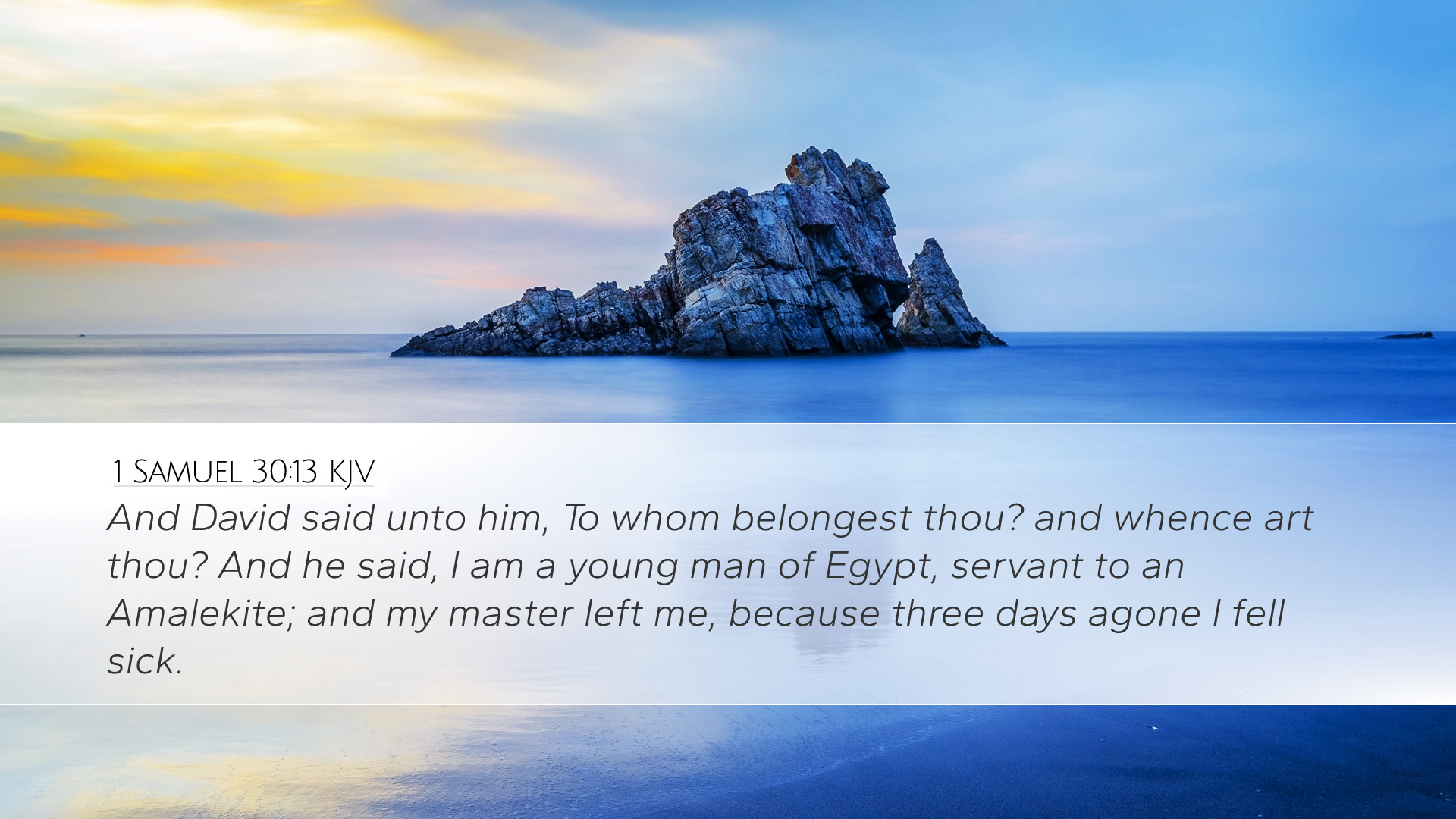Commentary on 1 Samuel 30:13
Verse Text: "And David said unto him, To whom belongest thou? and whence art thou? And he said, I am a young man of Egypt, servant to an Amalekite; and my master left me, because three days ago I fell sick."
Introduction
This verse captures a pivotal moment in the narrative of David. It reveals both his leadership qualities and the unfolding circumstances surrounding Israel's conflict with the Amalekites. Within this brief dialogue lies a wealth of theological and practical insights valuable for pastors, theologians, and students of the Word.
Contextual Background
The backdrop of this verse is the aftermath of the destruction of Ziklag, where David and his men found their families taken captive by the Amalekites. Upon discovering a wounded Egyptian slave, David's inquiry not only seeks information but also illustrates the human connections amid turmoil.
Theological Insights
- Inquiry and Engagement: David's question, "To whom belongest thou?" highlights his method of seeking counsel and wisdom from unexpected sources. This offers a model for leaders to be inclusive and open to guidance, even from those who may seem insignificant.
- The Importance of Identity: The response of the young man as a servant to an Amalekite emphasizes the role of servanthood and identity in Biblical narrative. It reflects the complexities of loyalty and the consequences of choices made by leaders.
- Mercy and Providence: David’s kindness in helping the abandoned Egyptian serves as a stark contrast to the cruelty of the Amalekites. It sheds light on God's providential care, where even a seemingly insignificant encounter leads to the fulfilling of His promises (cf. Romans 8:28).
Commentaries Insights
Matthew Henry
Henry emphasizes that David’s inquiry represents a wise leader recognizing value and information from the weak and vulnerable. This approach underlines that true leadership is marked by humility and attentiveness to all, regardless of their social status.
Albert Barnes
Barnes points out the significance of the young man's experience and how it reflects the larger narrative of suffering and recovery that characterizes much of David's story. Through the lens of the Egyptian’s plight, we see a foreshadowing of God’s redemptive work through hardship, resonating with the themes of restoration that permeate the Scriptures.
Adam Clarke
Clarke discusses the implications of the master leaving the servant due to illness, illuminating the harsh realities of loyalty amidst adversity. This scenario provides a sobering reminder of the transient nature of human relationships and the unpredictable realities of life in a fallen world.
Application for Leaders and Scholars
- Encouragement in Leadership: The way David handled the situation encourages leaders to value every person’s story and situation. It implies that every encounter can lead to significant developments and divine appointments.
- The Nature of Grace: This passage invites scholars to reflect on God's grace that transcends social boundaries. It challenges them to consider how our interactions can express grace to those whom society might overlook.
- Lessons of Compassion: In the modern church context, this verse serves as a reminder to exhibit compassion, understanding that human needs often lie behind complex situations.
Conclusion
1 Samuel 30:13 is more than a narrative detail; it encapsulates profound themes of leadership, mercy, and divine providence. As we reflect on David’s inquiry and the young man's identity, we are reminded of the importance of compassionate leadership and the far-reaching consequences of our interactions with other people. The experience of the Egyptian young man serves not just as a plot device; it powerfully illustrates the ways in which God weaves His providence through the tapestry of human lives.


